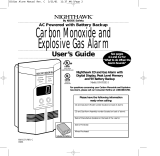
This CO alarm is designed to act as a monitor; it is not designed for use
as a short-term testing device to perform a quick check for the presence
of CO.
CO alarms have limitations. Like any other electronic device, CO alarms
are not fool-proof. CO alarms have a limited operational life. You must
test your CO alarm weekly, because it could fail to operate at any time.
If your CO alarm fails to test properly, or if its self-diagnostic test reveals
a malfunction, immediately have the unit replaced. This alarm will not
monitor CO levels while in an error condition.
CO alarms can only sense CO that reaches the unit’s sensor. It’s possible
that CO may be present in other areas without reaching the alarm. The
rate and ability that which CO reaches the alarm may be affected by:
• Doors or other obstructions.
• Fresh air from a vent, an open window or other source.
• CO being present on one level of the home and not reach a CO alarm
installed on a different level. (For example, CO in the basement may
not reach an alarm on the second level, near the bedrooms).
For these reasons, we recommend you provide complete coverage by
placing a CO alarm on every level of the home. Please carefully read all
information on properly installing this CO alarm.
CO alarms should not be used to detect the presence of natural gas
(methane), propane, butane, or other combustible fuels.
Instruct children never to touch, unplug or otherwise interfere with the
alarm. Warn children of the dangers of CO poisoning.
General Information About Explosive Gas:
Natural Gas is typically supplied through a main utility line connected to
your home. If you do not live in a rural area you are likely to be a user of
natural gas. Natural gas is much lighter than air and will rise rapidly. If
you are a user of natural gas, mount your CO and Gas alarm 12 inches
away from the ceiling to ensure the earliest opportunity to detect a leak.
Propane is typically supplied to homes via delivery truck in liquid form
and stored near the home in propane tanks. Propane and LP-gas (lique-
fied petroleum) are often used synonymously. Propane is much heavier
than air and will collect at lower levels. If you are a user of propane,
mount your CO and Gas alarm near the floor to ensure the earliest
opportunity to detect a leak.
1. Information About Carbon Monoxide
and Explosive Gas
2509-7214-03(820-1557D)_V1.QXD:_ 2019.3.1 8:52 AM Page 9






















